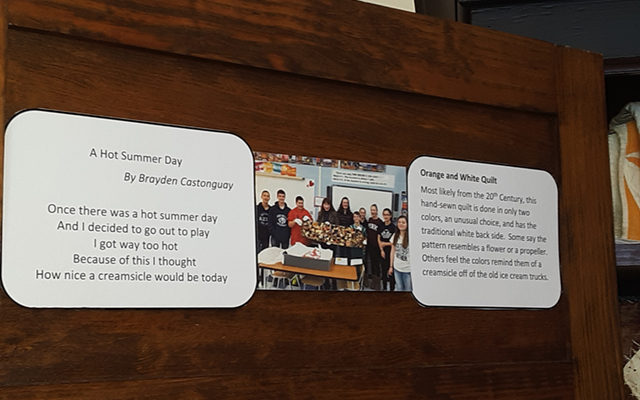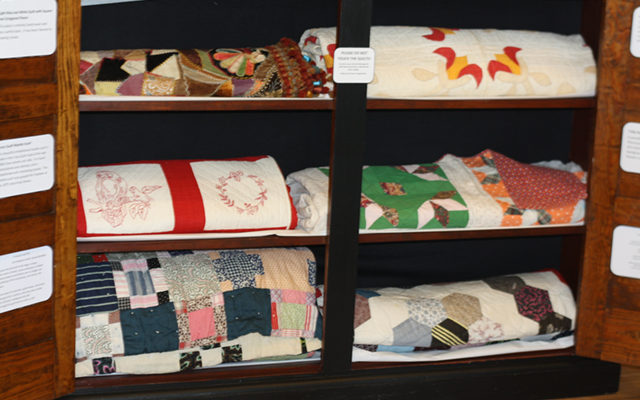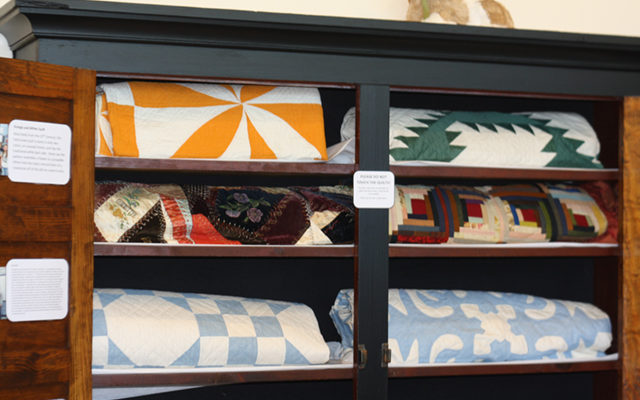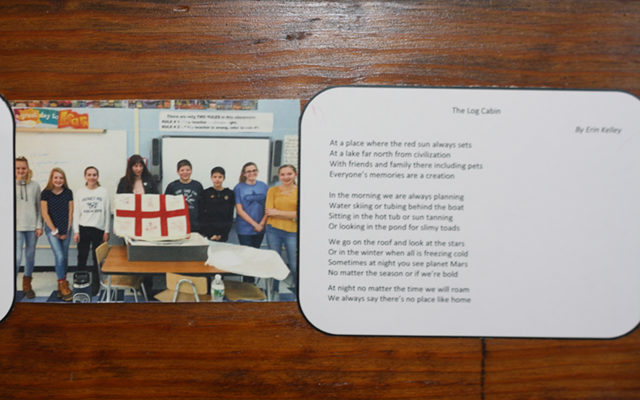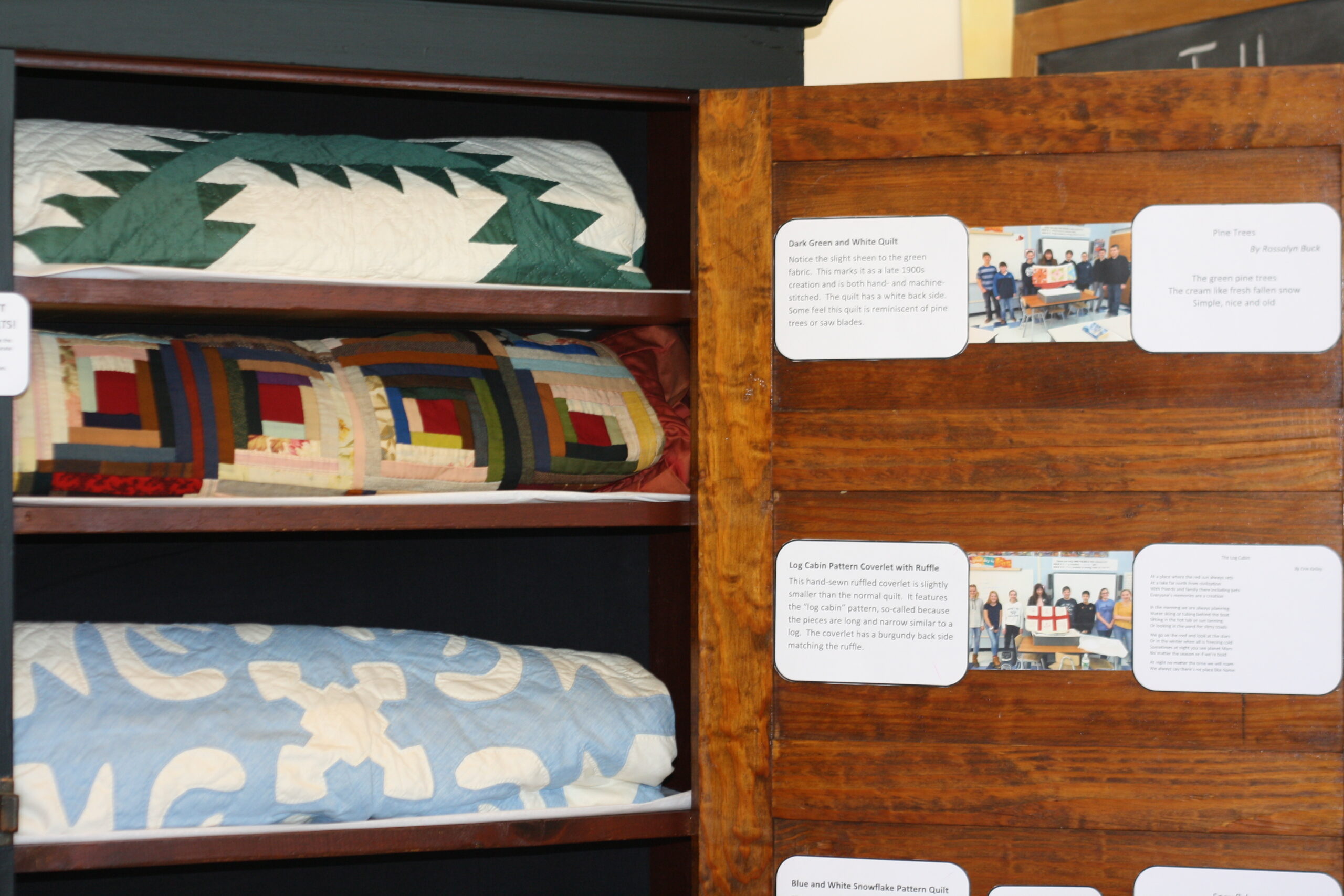
PRESQUE ISLE, Maine — The Maysville Museum in Presque Isle is now home to a brand new exhibit that features 12 historic, handmade quilts and numerous poems from eighth-graders who felt inspired to preserve local history.
On Saturday, June 1, Presque Isle Historical Society’s Maysville Museum debuted “Quilts: The Fabric of Life” to the community. Beside the quilts, which are preserved in a cabinet restored from the former Gouldville School, are poems that are either about or inspired by the quilts.
Around 60 students in Mary Graham’s English language arts classes at Presque Isle Middle School wrote poems during their three-week poetry unit last winter.
Many of the quilts in the historical society’s collection are ones that community members donated throughout the decades, while others were found in the Vera Estey House in 1984 when the society was given that property. The quilts date back to 1855 and span much of the 19th century.
“Originally, quilts were used to keep people warm but over time they developed into works of art,” exhibit curator Kim Smith said. “One quilt here is called a ‘crazy quilt’ because of its design and how it was placed across the mantel of a fireplace.”
To help the eighth-graders gain inspiration, Smith brought some of the quilts to each of Graham’s classes and spoke of the quilts’ histories in Aroostook County. Many students touched the quilts and actively asked questions about the history behind them.
Smith said that although she had been looking forward to speaking with the students, even she was pleasantly surprised at how engaged they were with the history lesson and the strong poetic responses the quilts evoked.
“During the first class back in December, I had been showing them quilts that had darker colors like blue, gray and black. One girl responded by saying, ‘That one makes me feel so melancholy,’” Smith said. “I was blown away.”
Clark said that writing her poem was relatively easy after she let her creativity and memories of the quilts take over.
“I’ve always been interested in poetry. It was helpful to write about something that I cared about,” she said. “I was looking at a blue quilt and it made me think of a melancholy picnic, one that wasn’t happy or sad.”
Throughout the poetry unit, Graham required students to write four types of poems: sonnets, limericks, haikus and free verse. They were not required to only write about the quilts, but numerous students chose to after seeing the antique treasures up close.
Jaylee Howlett wrote a limerick that she called “Snowflake” after seeing a light blue quilt with a snowflake pattern. The poem tells about a boy named Charlie who wraps himself up in a quilt to keep warm during a snowstorm.
“It was super cool to see things from the olden days and help bring them back to life,” Howlett said about the quilts. “If we hadn’t seen the quilts or had them explained to us I don’t think the poems would have been as good.”
“I sat back and thought to myself, ‘Wow,’” Graham said. “The poems made me want to cuddle up with the quilts. I can see us doing something like this again because it really brought our poetry unit to life.”
The concept of the poetry quilt project came to Smith after she attended the Maine Governor’s Conference of Tourism in April 2018, which featured a presentation from Maine Poet Laureate Stuart Kestenbaum. That year Kestenbaum partnered with the Maine Office of Tourism to launch the Poetry Card Project. The office printed and distributed poems about Maine, written by Maine authors, to hotels across the state.
Smith helped the historical society obtain a $1,000 grant from the Maine Humanities Council that allowed her to catalogue all the quilts and conduct research on their origins. For the exhibit she also catalogued all the eighth-graders’ poems into a book that people can view at the Maysville Museum.
Student Bella Quirino, who wrote a free verse poem called “History of Quilting,” appreciated the opportunity to combine a local history lesson with the personal expression that comes from writing poetry.
“The project came easily to me because it was so interesting,” she said. “Poetry became a really good way for us to express how we were feeling about the quilts.”
The Maysville Museum is located at 165 Caribou Road and is open from 10 a.m. to 2 p.m. Monday-Saturday through October.
- “A Hot Summer Day” and “Orange and White Quilt” by Brandon Castonguay are two poems inspired by an orange and white antique quilt that are featured in a newly opened exhibit at the Maysville Museum in Presque Isle. (Melissa Lizotte | The Star-Herald)
- The Maysville Museum has opened a new exhibit that aims to preserve antique quilts from Aroostook County. Eighth graders from Presque Isle Middle School contributed numerous poems that they wrote about or inspired by the quilts. (Melissa Lizotte | The Star-Herald)
- A new exhibit at the Maysville Museum in Presque Isle showecases 19th century antique quilts from Aroostook County and the poems that local 8th graders wrote in response. (Melissa Lizotte | The Star-Herald)
- “The Log Cabin” by 8th grader Erin Kelley is one of the poems showcased in the new exhibit called “Quilts: The Fabric of Life” at the Maysville Museum in Presque Isle. (Melissa Lizotte | The Star-Herald)

